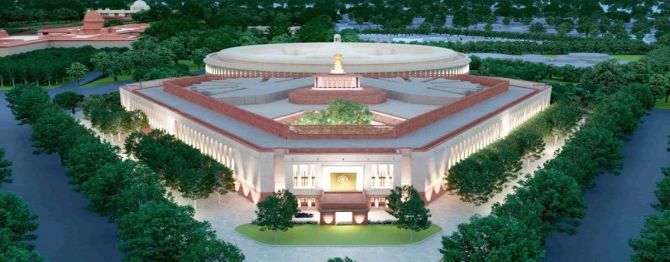The Centre's ambitious Central Vista Project, covering a 3-km stretch from Rashtrapati Bhavan to India Gate in Lutyens' Delhi, got the green signal on Tuesday from the Supreme Court which found 'no infirmity' in grant of environment clearance and other permissions.

The top court said it cannot 'jump to put a full stop on execution of policy matters' and the courts cannot be called upon to 'govern'.
The Central Vista revamp, announced in September, 2019 envisages a new triangular Parliament building, with a seating capacity for 900 to 1,200 MPs, that is to be constructed by August, 2022 when the country will be celebrating its 75th Independence Day.
The common Central Secretariat is likely to be built by 2024 under the project.
A three-judge bench headed by Justice A M Khanwilkar, by 2:1 majority, held that the grant of environmental clearance and the notification for change in land use for construction of new Parliament building under the project was valid.
"We hold that there is no infirmity in the grant of: (a) 'No Objection' by the Central Vista Committee (CVC)'.'Approval' by the Delhi Urban Art Commission (DUAC) as per the DUAC Act, 1973; and (c) 'Prior approval' by the Heritage Conservation Committee (HCC) under clause 1.12 of the Building Byelaws for Delhi, 2016," said Justice Khanwilkar, writing the judgment for himself and Justice Dinesh Maheshwari.
Justice Sanjiv Khanna, the third judge on the bench, wrote a dissenting 179-page judgement on aspects relating to public participation in the decision-making process and on alleged failure on the part of the authorities in taking prior approval of the HCC for the project.
"Since I have reservations with the opinion expressed by my esteemed brother A M Khanwilkar, J on the aspects of public participation on interpretation of the statutory provisions, failure to take prior approval of the Heritage Conservation Committee and the order passed by the Expert Appraisal Committee, I have penned down a separate dissenting judgment," Justice Khanna said.
He concurred however with the majority verdict on the aspects of 'notice inviting Bid, award of consultancy and the order of the Urban Arts Commission, as a standalone and independent order'.
The majority 432-page judgement of Justice Khanwilkar dealt with several aspects and objections raised in as many as 10 petitions including the one filed by Rajeev Suri.
"We are equally compelled to wonder if we can jump to put a full stop on execution of policy matters in the first instance without a demonstration of irreparable loss or urgent necessity, or if we can guide the government on moral or ethical matters without any legal basis. In light of the settled law, we should be loath to venture into these areas.
"We need to say this because in the recent past, the route of public/social interest litigation is being increasingly invoked to call upon the Court to examine pure concerns of policy and sorts of generalised grievances against the system. No doubt, the Courts are repositories of immense public trust and the fact that some public interest actions have generated commendable results is noteworthy, but it is equally important to realise that Courts operate within the boundaries defined by the Constitution. We cannot be called upon to govern," it said.
The majority verdict held the exercise of power by the central government under DDA Act, was 'just and proper' in effecting the modifications regarding change in land use of seven plots of the Central Vista project.
It confirmed the government's notification of March 20, 2020 on the land use.
"The recommendation of Environmental Clearance (EC) by Expert Appraisal Committee (EAC) and grant thereof by MoEF is just, proper and in accordance with law including the 2006 Notification. We uphold the same along with appropriate directions therein to ensure that the highlighted mitigating measures are followed by the project proponent in their letter and spirit," it held.
The majority verdict also said project proponent may set up smog tower(s) of adequate capacity, as being an integral part of new Parliament building project and additionally, use smog guns at the construction site throughout the construction phase is in progress on the site.
It said prior permission of HCC can be obtained when the development work commences and it was not needed at the stage of planning and formalization of the project.
"Accordingly, the respondents (authorities) shall obtain...prior permission of the designated Authority before actually starting any development/redevelopment work on the stated plots/structures/precincts governed by the heritage laws...if already not obtained," it said.
It also held as 'just and proper', the selection or appointment of consultants for the project.
The bench said that it was of the view that the grant of EC was in 'conformity with the mandate of the competent authority and is just and proper'.
"The project proponent has undertaken various expert studies to prepare a comprehensive traffic management plan, solid waste management plan, water management plan and waste disposal plan," it said.
Once an expert committee has duly applied its mind to an application for EC, any challenge to its decision has to be based on concrete material which reveals total absence of mind, the bench said, adding that the facts of the case do not reveal any deliberate concealment of information.
It said all relevant documents from the stage of expression of need for the project were placed in public domain.










 © 2025
© 2025